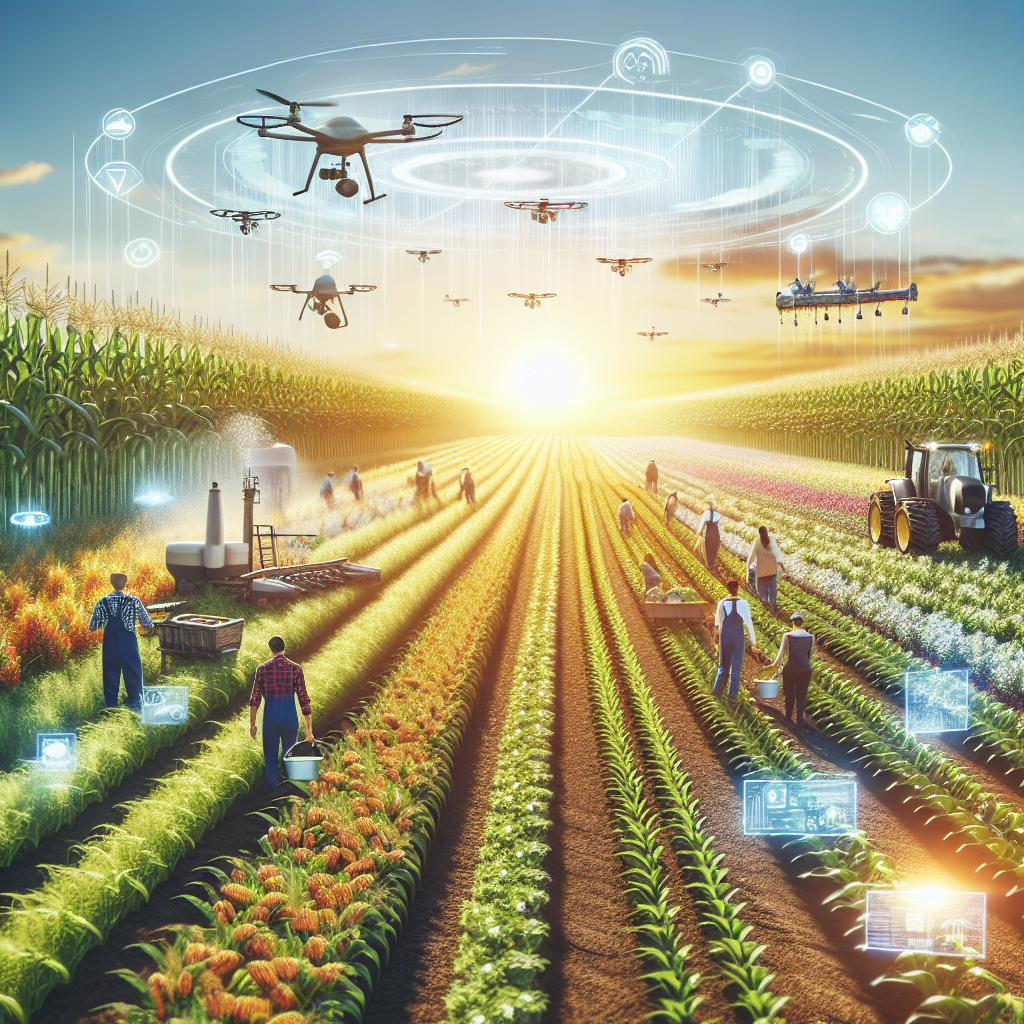The Future of Farming: How AI is Revolutionizing Agriculture
Farming has been a crucial part of human society for thousands of years. However, as the global population continues to grow, the demand for food is increasing at an unprecedented rate. This has put a significant strain on traditional farming methods, leading to the need for more efficient and sustainable practices. Enter artificial intelligence (AI), a technology that is revolutionizing the way we grow and produce food.
AI in agriculture is not a new concept, but recent advancements in machine learning and data analytics have allowed farmers to harness the power of AI in ways that were previously unimaginable. From precision farming to crop monitoring, AI is transforming every aspect of agriculture, making it more efficient, productive, and sustainable. In this article, we will explore how AI is changing the future of farming and what it means for the agriculture industry as a whole.
Precision Farming
One of the most significant ways AI is revolutionizing agriculture is through precision farming. Precision farming is the practice of using data-driven technologies such as AI, GPS, and sensors to optimize crop yields and reduce waste. By analyzing data on soil quality, weather patterns, and crop health, AI algorithms can help farmers make more informed decisions about when to plant, water, and harvest their crops.
For example, AI-powered drones can be used to monitor crop health and identify areas of the field that need attention. This information can then be used to apply fertilizers, pesticides, or water only where they are needed, reducing waste and maximizing yields. Similarly, AI-powered tractors can be used to plant seeds at precise depths and intervals, ensuring optimal growth and reducing the need for manual labor.
Crop Monitoring
Another area where AI is making a significant impact in agriculture is crop monitoring. By analyzing satellite imagery, weather data, and other sources of information, AI algorithms can help farmers track the health and growth of their crops in real-time. This allows farmers to identify potential issues such as pests, diseases, or nutrient deficiencies before they become a problem.
AI-powered sensors can also be used to monitor soil moisture levels, temperature, and other environmental factors that can affect crop growth. By collecting and analyzing this data, farmers can make more informed decisions about when to irrigate, fertilize, or take other actions to optimize crop yields.
Supply Chain Optimization
In addition to improving on-farm practices, AI is also being used to optimize the entire agricultural supply chain. By analyzing data on market trends, consumer preferences, and logistical factors, AI algorithms can help farmers and food producers make better decisions about what to grow, when to harvest, and how to distribute their products.
For example, AI can help farmers predict demand for certain crops based on historical sales data and market trends. This information can then be used to plan planting schedules and optimize production to meet consumer demand. AI can also help food producers identify the most efficient routes for transporting goods to market, reducing costs and minimizing waste.
Environmental Sustainability
One of the key benefits of AI in agriculture is its potential to promote environmental sustainability. By optimizing resource use, reducing waste, and minimizing the use of harmful chemicals, AI can help farmers reduce their environmental footprint and protect natural resources for future generations.
For example, AI-powered irrigation systems can be used to water crops more efficiently, reducing water waste and minimizing the risk of over-irrigation. Similarly, AI algorithms can help farmers identify alternative pest control methods that are less harmful to the environment, reducing the need for chemical pesticides.
FAQs
Q: How is AI being used in agriculture today?
A: AI is being used in agriculture in a variety of ways, including precision farming, crop monitoring, supply chain optimization, and environmental sustainability. These technologies are helping farmers make more informed decisions about when to plant, water, and harvest their crops, as well as how to optimize production and distribution to meet consumer demand.
Q: What are the benefits of using AI in agriculture?
A: The benefits of using AI in agriculture are numerous, including increased productivity, reduced waste, and improved sustainability. By harnessing the power of AI, farmers can optimize resource use, reduce environmental impact, and improve overall efficiency in the production and distribution of food.
Q: What are the challenges of implementing AI in agriculture?
A: While AI has the potential to revolutionize agriculture, there are also challenges to overcome, including cost, infrastructure, and data privacy concerns. Many farmers may not have the resources or technical expertise to implement AI technologies, while others may be hesitant to share sensitive data with third-party providers.
Q: What does the future of farming look like with AI?
A: The future of farming with AI looks promising, with the potential to revolutionize the agriculture industry and make food production more efficient, sustainable, and resilient. As AI technologies continue to evolve, we can expect to see more advanced solutions that help farmers meet the challenges of a growing population and a changing climate.
In conclusion, AI is revolutionizing agriculture in ways that were once unimaginable. From precision farming to supply chain optimization, AI is helping farmers make more informed decisions about how to grow, produce, and distribute food. By harnessing the power of AI, farmers can increase productivity, reduce waste, and promote environmental sustainability in the agriculture industry. As the technology continues to evolve, the future of farming with AI looks promising, with the potential to transform food production for the better.

